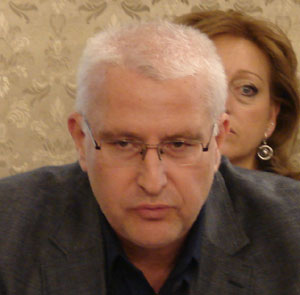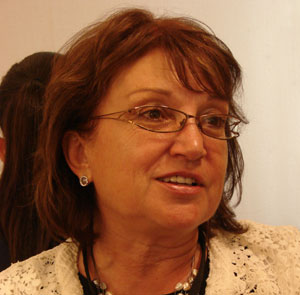Education in Bulgaria should be a universal, supra-political priority. This is what teachers from Bulgarian schools abroad called for at their annual conference in Sofia.
“The Bulgarian language – a spiritual bridge to national unity” – this was the motto of the forum, hosted this year by the National Assembly.
“There are very few school networks on a scale like our Association,” says Irina Vladikova, chairperson of the Association of Bulgarian Schools Abroad. “At the beginning they could be counted on the fingers of one hand, now there are close to 400, according to data of the State Agency for Bulgarians Abroad. An impressive number, but also a phenomenon in the most modern history of the Bulgarian system of education and culture.”
Over the 11 years of its existence the Association of Bulgarian Schools Abroad has come to occupy an important place in public life. The initiatives launched by Bulgarian schools abroad have been eliciting a widespread response inside the country, and the causes they promote have been acquiring national and international significance. An example in this respect is the petition launched by the Association aimed at providing a legal and administrative option for sitting for a matriculation exam in any of the official languages of the EU. Known as the “small-entry” languages petition, this year it managed to come up for consideration by the European Parliament, and Mrs. Vladikova described its progress as one of the biggest achievements by the Association of Bulgarian Schools Abroad in the year of the country’s first-time presidency of the Council of the EU.
“Regrettably, in recent years mother-tongue education has stopped being a priority in Europe. We knew we had the right to demand it, to fight for it, and there was the good example of Ireland, where children have the privilege of sitting for an exam in the Bulgarian language, which is recognized by their education system and provides privileges.”
By their efforts, school teachers and the state, with the support of Bulgarian MEPs, paved the way for the petition, and concrete results were not late in coming:
 “I was approached by a representative of the European Commission for the first time, who told me that this petition coincided with the general trend of reform in the EU, where language competencies will be a guiding principle, alongside civic education. The EC recommendations include recommendations to the nation states taken from the small-entry language petition, and that means that we have all been legislating without realizing it, and that is a maximum achievement, seeing as we started out simply to protect the Bulgarian language,” says MEP Svetoslav Malinov.
“I was approached by a representative of the European Commission for the first time, who told me that this petition coincided with the general trend of reform in the EU, where language competencies will be a guiding principle, alongside civic education. The EC recommendations include recommendations to the nation states taken from the small-entry language petition, and that means that we have all been legislating without realizing it, and that is a maximum achievement, seeing as we started out simply to protect the Bulgarian language,” says MEP Svetoslav Malinov.
Ignoring knowledge of the mother-tongue in emigrant families restricts the options their children have of returning to the country. It is in overcoming this obstacle that Boyanka Ivanova, headmistress of the John Atanassof Bulgarian school and cultural centre in Chicago, and member of the Association’s board, sees the role of schools abroad. It was at her school that the first Bulgarian language exam was held for acquiring the Seal of Biliteracy – the other major achievement with regard to the status of the Bulgarian language abroad, its recognition as a second official language in 12 states of the US.
 “We, the members of the board of the Association work in the American system of education and we have been observing the processes there, but we are also headmasters of Bulgarian schools on the territory of Chicago. We looked for options the American system offers to include our language, and we found them in the biliteracy programme, created on the initiative of parents of Spanish-speaking children in California,” says Boyanka Ivanova. “We started from Illinois because that is where the biggest Bulgarian community lives. The states where we have been successful and the Bulgarian language has gradually been making its way into the system of education are Ohio, Michigan, Colorado, California, Pennsylvania, New Jersey, New York, Virginia, Maryland, the District of Columbia and North Carolina. A memorandum was signed and grade from the exam conducted, following the methodology of the Department of Language Teaching of the St. Kliment Ohridski University of Sofia, counts towards admission, for children returning to the country, to universities on the territory of Bulgaria or in some other European countries.”
“We, the members of the board of the Association work in the American system of education and we have been observing the processes there, but we are also headmasters of Bulgarian schools on the territory of Chicago. We looked for options the American system offers to include our language, and we found them in the biliteracy programme, created on the initiative of parents of Spanish-speaking children in California,” says Boyanka Ivanova. “We started from Illinois because that is where the biggest Bulgarian community lives. The states where we have been successful and the Bulgarian language has gradually been making its way into the system of education are Ohio, Michigan, Colorado, California, Pennsylvania, New Jersey, New York, Virginia, Maryland, the District of Columbia and North Carolina. A memorandum was signed and grade from the exam conducted, following the methodology of the Department of Language Teaching of the St. Kliment Ohridski University of Sofia, counts towards admission, for children returning to the country, to universities on the territory of Bulgaria or in some other European countries.”
The return of children of Bulgarians living in other countries would close the cycle, with the help of the efforts of Bulgarian school teachers abroad towards the preservation of the Bulgarian language and culture abroad.
English version: Milena Daynova
Photos: Elena KarkalanovaThe 38th edition of the Cinemania (Kinomania) Film Festival will kick off in Hall 1 of the National Palace of Culture in Sofia tonight, November 13. The cinematic panorama opens with the newest feature film by director Milko Lazarov, Tarika ,..
The 38th edition of Cinemania ( Kinomania ) starts in Hall 1 of the National Palace of Culture in Sofia. The festival opens on November 13 with a premiere of the film "Tarika". After its successes around the world and the completely..
Bulgarians from 18 countries, 34 schools abroad, and 8 Bulgarian lecturers from universities abroad are the participants in the first year of the "Untold Stories of the Bulgarians" National Program, which seeks out little-known facts..

+359 2 9336 661
